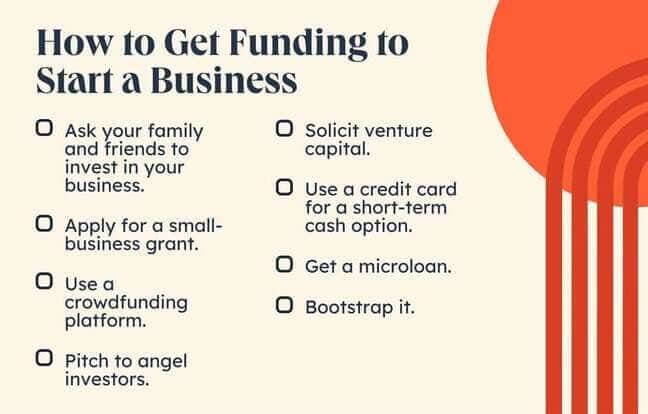How to arrange Financial Resources for A New startup?
Introduction
Starting a new startup is an exciting journey filled with possibilities, but it also comes with the challenge of arranging financial resources. Many budding entrepreneurs find themselves puzzled about where to begin. Fear not! In this blog, we’ll explore practical and easily understandable strategies to help you secure the financial backing your startup needs.
1) Craft a Detailed Business Plan:
Before diving into the financial realm, develop a comprehensive business plan. Outline your business goals, target audience, revenue streams, and projected expenses. This document will be your roadmap and a vital tool when seeking financial support.
- Clarity of Vision: Clearly define your business goals, target market, and revenue streams in your business plan. A well-defined vision will not only guide your operations but also attract potential investors.
- Financial Projections: Provide realistic financial projections, outlining both anticipated expenses and revenue. This will help you assess the amount of funding required and demonstrate your understanding of the financial aspects of your business.
2) Personal Savings and Bootstrapping:
Start with what you have. Utilize your personal savings or explore the concept of bootstrapping – running your startup with minimal external help. This not only demonstrates your commitment but also reduces the pressure of debt.
- Commitment and Confidence: Utilizing personal savings or bootstrapping demonstrates your commitment to the venture. It instills confidence in potential investors, showing that you are personally invested in the success of your startup.
- Financial Control: Bootstrapping allows you to maintain control over your business without external influences. This financial independence can be empowering during the initial stages of your startup.
3) Family and Friends:
Don’t underestimate the power of your closest circle. Approach family and friends who believe in your vision. Clearly communicate the risks involved, and consider formalizing any agreements to avoid misunderstandings.
- Trust and Support: Turning to family and friends for financial support relies on trust and mutual belief in your venture. This support network not only provides funds but can also offer emotional support, crucial during the challenges of startup life.
- Clear Communication: Clearly communicate the risks involved and set expectations from the outset. Formalizing agreements, even with loved ones, helps prevent misunderstandings and preserves relationships.
4) Angel Investors:
Angel investors are individuals who provide financial support to startups in exchange for equity. Look for investors who share your passion for your business and can offer valuable advice along with their financial backing.
- Expertise and Guidance: Beyond financial backing, angel investors often bring industry expertise and valuable guidance. Look for investors whose experience aligns with your business, as they can contribute strategic insights.
- Network Access: Angel investors typically have extensive networks. Associating with them can open doors to potential partnerships, customers, and other investors, expanding the reach and opportunities for your startup.
5) Venture Capital:
For startups with high growth potential, venture capital could be an excellent option. Venture capitalists invest larger sums of money in exchange for equity. Ensure your business aligns with their investment criteria.
- Scale and Growth: Venture capital is ideal for startups with high growth potential. Investors seek businesses that can scale rapidly, offering the possibility of substantial returns. Align your pitch with their focus on scalability.
- Strategic Alignment: Choose venture capitalists who align with your business values and vision. Beyond funds, their strategic guidance can significantly impact the trajectory of your startup.
6) Crowdfunding Platforms:
Leverage the power of the crowd through crowdfunding platforms like Kickstarter or Indiegogo. Create compelling campaigns to attract backers who believe in your idea. This approach not only secures funds but also validates your concept in the market.
- Compelling Campaign: Craft a compelling and transparent crowdfunding campaign. Clearly articulate the problem your startup solves and why it’s worth supporting. Engage potential backers with a compelling story, visuals, and perks to make your campaign stand out.
- Community Building: Leverage crowdfunding not just for funds but also to build a community around your product or service. Engage with backers, keep them informed, and turn them into advocates who can amplify your startup’s reach.
7) Government Grants and Subsidies:
Investigate potential government grants and subsidies available for startups in your industry. Many governments offer financial support to encourage entrepreneurship. Research and apply for these opportunities.
- Thorough Research: Conduct thorough research to identify relevant government grants and subsidies for your industry. Government support can provide a significant financial boost, but it’s crucial to understand and meet the specific criteria for each opportunity.
- Application Precision: When applying for grants, pay attention to detail and follow all application guidelines. Clearly demonstrate how your startup aligns with the goals of the grant program and how the funds will be utilized to achieve meaningful outcomes.
8) Bank Loans and Lines of Credit:
Traditional financing options like bank loans or lines of credit remain a viable route. Prepare a solid case for your startup, including a well-documented business plan, to increase your chances of approval.
- Robust Business Plan: A comprehensive business plan is crucial when seeking traditional financing. Provide detailed financial projections, showcase market research, and highlight your team’s qualifications to instill confidence in lenders.
- Risk Mitigation: Be prepared to discuss how your startup plans to mitigate risks. Lenders want assurance that you have considered potential challenges and have strategies in place to navigate them successfully.
9) Business Incubators and Accelerators:
Joining a business incubator or accelerator can provide not only funding but also mentorship and networking opportunities. These programs often have established relationships with investors.
- Mentorship Value: Seek out incubators and accelerators that offer more than just funding. The mentorship and guidance provided by these programs can be invaluable, helping you navigate challenges and make informed decisions.
- Network Opportunities: Joining such programs exposes your startup to a network of industry experts, investors, and fellow entrepreneurs. Leverage these connections for collaboration, learning, and potential future investments.
10) Strategic Partnerships:
Explore strategic partnerships with established companies in your industry. These partnerships can bring in financial support, access to resources, and credibility to your startup.
- Mutual Benefit: Identify potential partners whose strengths complement your startup’s weaknesses, and vice versa. A mutually beneficial partnership can bring in not only financial resources but also shared expertise, resources, and market access.
- Clear Agreements: Establish clear agreements outlining the terms of the partnership, including financial commitments, roles, and expectations. Clear communication and understanding are key to a successful and enduring strategic partnership.
Conclusion: Financial Resources for A New startup
Starting a new startup is undoubtedly challenging, but with a well-thought-out plan and the right financial resources, you can turn your vision into reality. Whether it’s your own savings, support from friends and family, or funding from external sources, the key is to be resourceful and persistent. Remember, every successful startup started somewhere, and your journey begins with securing the financial foundation to fuel your entrepreneurial dreams.
Stay connected with us on social media for regular updates, tips, and engaging content:
- Facebook: Follow us now
- Twitter: Follow us now
- Instagram: Follow us now
We’d love to hear your thoughts! Share your favorite online business idea or tell us if you’ve already embarked on an entrepreneurial journey. Your insights and experiences could inspire others on their path to success. Drop a comment below and let’s build a community of online innovators!




One thought on “How to arrange Financial Resources for A New startup?”